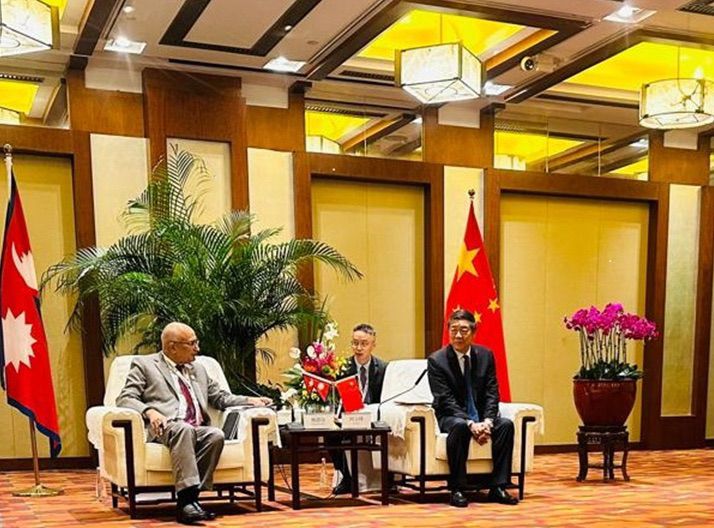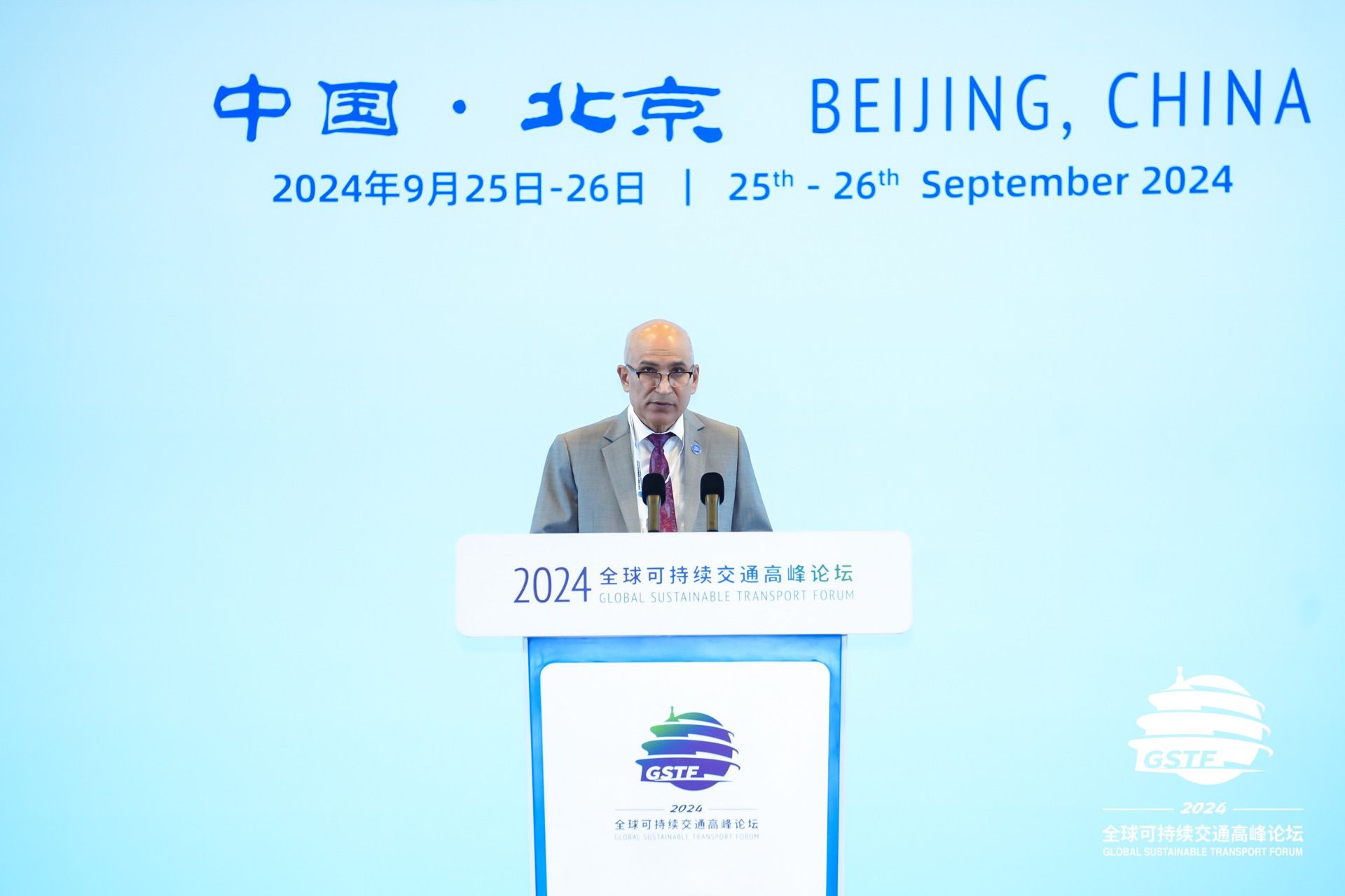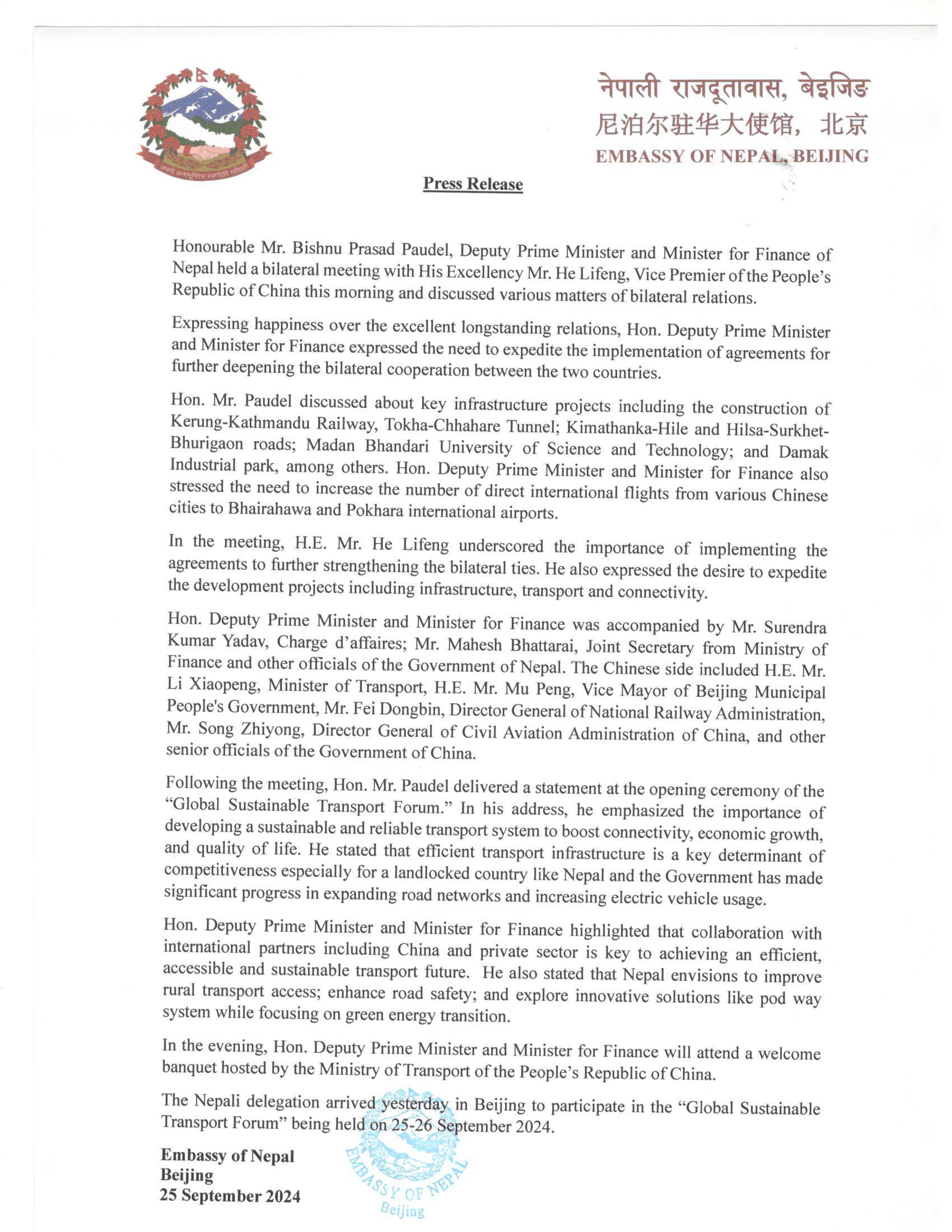


Statement delivered by Honorable Mr. Bishnu Prasad Paudel, Deputy Prime Minister and Minister of Finance of Nepal @ Global Sustainable Transport Forum 2024,
Beijing, 25 September 2024
His Excellency Mr. He Lifeng,
Vice-Premier of the People’s Republic of China,
His Excellency Mr. Suriya Jungrungreangkit, Deputy Prime Minister of the Kingdom of Thailand
His Excellency Mr. Li Xiaopeng, Minister of Transport of the People’s Republic of China,
Honourable Ministers,
Excellencies,
Distinguished Guests,
Ladies and Gentlemen,
Namaskar, Good Morning and Ni Hao!
I am truly privileged to be part of this esteemed gathering at the Global Sustainable Transport Forum 2024 in the beautiful city of Beijing, China. On behalf of the government of Nepal, I extend my heartfelt congratulations and appreciation to the Global Sustainable Transport Innovation and Knowledge-Center and the Government of China for hosting this vital event. I would also like to express my sincere gratitude to the organizer for the warm hospitality extended to me and my delegation.
The theme of this Forum, Sustainable Transport: Logistics Connecting the World, is particularly relevant in today’s context. It reflects the pressing need for innovative solutions in our transport systems. This issue is also directly linked to our commitment to sustainable development goals.
I would like to take a moment to share some insights on the significance of sustainable transport, particularly in the context of Nepal.
In Nepal, access to affordable and efficient transportation is critical. Our transport sector plays a vital role in connecting communities, fostering economic growth, and enhancing the quality of life for our citizens. Developing a sustainable transport system serves multiple purposes: it connects distant places, provides mobility for underserved populations, improves road safety, and mitigates environmental impacts.
The government of Nepal is dedicated to establishing a sustainable and reliable transport system across the country. We are expanding our road network each year, including both national highways and rural access roads, while also prioritizing air and rail connectivity. As a landlocked country, robust air and ground transport systems are fundamental for the development of the country.
However, we recognize that the transport infrastructure gap remains a significant barrier to unlocking our economic potential and attracting private investment. In a rapidly growing global landscape, efficient transport infrastructure is a key determinant of competitiveness especially for a landlocked country like Nepal. We are making considerable progress in expanding our road network despite the challenges posed by our difficult terrain, yet we continue to face increasing urban congestion that affects productivity and quality of life.
I am pleased to highlight that Nepal has achieved remarkable progress in transitioning from non-electric to electric vehicles, supported by government tax subsidy policies. Currently, approximately 75% of our four-wheeler imports are electric vehicles, a significant rise from less than 10% five years ago. This shift not only aligns with our commitment to sustainability but also demonstrates our potential to adapt and innovate technology in transport sector.
As we reflect on the pressing challenges that demand our immediate attention, it is essential to ensure that rural areas are well-connected and accessible. This will require substantial investment in infrastructure and creative solutions to overcome geographical barriers. Upgrading our transport systems is essential; enhancing the quality and safety of our roads will accommodate the increasing number of users. To improve urban congestion, we must explore the construction of highways and flyovers that facilitate smoother traffic flow, alongside implementing strong transport management systems to ensure the safety of all users. Moreover, sustainability must be at the forefront of our infrastructure development, with green transportation modes that help reduce emissions and protect our environment for future generations.
At this pivotal moment in our journey toward a more sustainable future, we must focus on three key areas: strengthening transport governance and emergency response, fostering inclusive rural transport, and promoting the transition to green energy.
Enhancing cooperation in governance and emergency response is vital. By fostering collaboration among nations, we can boost our resilience and ensure our transport systems are prepared for future challenges.
In addition, equally important is our commitment to creating a fair and inclusive rural transport system. Everyone deserves safe and convenient travel, regardless of their location. Given the country’s unique landscape and environmental concerns, integrating ropeway and podway systems would be a forward-thinking approach to enhance mobility, connectivity, and sustainable development.
To address these challenges for sustainable transport management, collaboration among governments, the private sector, and communities is essential. Let us remember that sustainable transport is not only an option; it is a necessity. By pooling our resources and expertise, we can establish a transport system that is efficient, accessible, and sustainable.
The People’s Republic of China has developed remarkable technologies and inventions in the field of science and technology, including the sustainable transport. As a close and friendly neighbour of China, Nepal wants to be benefitted from this incredible research and development.
Finally, promoting new energy development is crucial for accelerating the green and low-carbon transition of global transport. Acceptance of innovative technologies and renewable energy sources will not only reduce our carbon footprint but also lay the foundation for a cleaner and healthier planet.
Together, let us commit to a future where sustainable transport is not just an aspiration, but a tangible reality for all.
Thank you.
